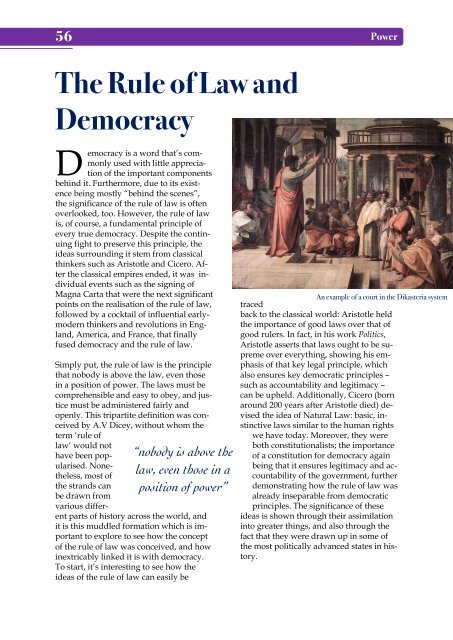Create successful ePaper yourself
Turn your PDF publications into a flip-book with our unique Google optimized e-Paper software.
56 Power<br />
<strong>The</strong> Rule of Law and<br />
Democracy<br />
D<br />
emocracy is a word that’s commonly<br />
used with little appreciation<br />
of the important components<br />
behind it. Furthermore, due to its existence<br />
being mostly “behind the scenes”,<br />
the significance of the rule of law is often<br />
overlooked, too. However, the rule of law<br />
is, of course, a fundamental principle of<br />
every true democracy. Despite the continuing<br />
fight to preserve this principle, the<br />
ideas surrounding it stem from classical<br />
thinkers such as Aristotle and Cicero. After<br />
the classical empires ended, it was individual<br />
events such as the signing of<br />
Magna Carta that were the next significant<br />
points on the realisation of the rule of law,<br />
followed by a cocktail of influential earlymodern<br />
thinkers and revolutions in England,<br />
America, and France, that finally<br />
fused democracy and the rule of law.<br />
Simply put, the rule of law is the principle<br />
that nobody is above the law, even those<br />
in a position of power. <strong>The</strong> laws must be<br />
comprehensible and easy to obey, and justice<br />
must be administered fairly and<br />
openly. This tripartite definition was conceived<br />
by A.V Dicey, without whom the<br />
term ‘rule of<br />
law’ would not<br />
have been popularised.<br />
Nonetheless,<br />
most of<br />
the strands can<br />
be drawn from<br />
various different<br />
parts of history across the world, and<br />
it is this muddled formation which is important<br />
to explore to see how the concept<br />
of the rule of law was conceived, and how<br />
inextricably linked it is with democracy.<br />
To start, it’s interesting to see how the<br />
ideas of the rule of law can easily be<br />
“nobody is above the<br />
law, even those in a<br />
position of power”<br />
An example of a court in the Dikasteria system<br />
traced<br />
back to the classical world: Aristotle held<br />
the importance of good laws over that of<br />
good rulers. In fact, in his work Politics,<br />
Aristotle asserts that laws ought to be supreme<br />
over everything, showing his emphasis<br />
of that key legal principle, which<br />
also ensures key democratic principles –<br />
such as accountability and legitimacy –<br />
can be upheld. Additionally, Cicero (born<br />
around 200 years after Aristotle died) devised<br />
the idea of Natural Law: basic, instinctive<br />
laws similar to the human rights<br />
we have today. Moreover, they were<br />
both constitutionalists; the importance<br />
of a constitution for democracy again<br />
being that it ensures legitimacy and accountability<br />
of the government, further<br />
demonstrating how the rule of law was<br />
already inseparable from democratic<br />
principles. <strong>The</strong> significance of these<br />
ideas is shown through their assimilation<br />
into greater things, and also through the<br />
fact that they were drawn up in some of<br />
the most politically advanced states in history.


















